Iran Politicians Warn About Corruption In Shady Privatization Plan
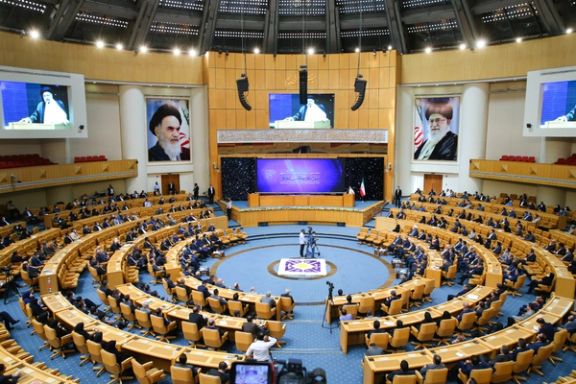
Iranian politicians have revealed further corruption among individuals involved in Iran’s shady privatization policy, which is widely criticized by the media.

Iranian politicians have revealed further corruption among individuals involved in Iran’s shady privatization policy, which is widely criticized by the media.
Critics see a hasty plan to sell off government properties and companies as a way of "plundering Iran’s resources in the course of liquidating the country’s national assets."
Conservative news website Alef has quoted Ahmad Tavakkoli, the head of the Iranian NGO, Transparency and Justice Monitor, as saying in a letter to lawmakers, the heads of the three powers of the government and the privatization board that the plan "should be totally rejected."
The media reported in January that Vice President Mohammad Mokhber, Economy Minister Ehsan Khandouzi, Interior Minister Ahmad Vahidi, Roads Minister Mehrdad Bazrpash, and four other officials will form the Privatization Board. Reports at the time said that an order issued by the heads of the three powers of the government bars critics of disclosing details of transactions and suspends for two years all legislations that might prevent these transactions.
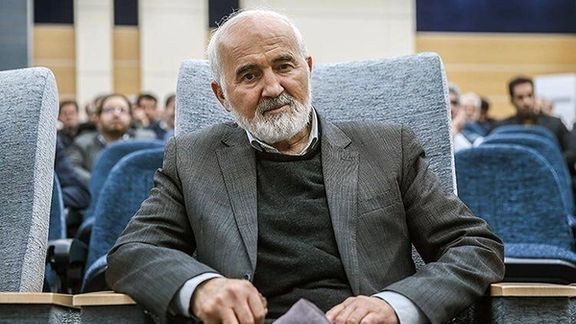
The members of the Privatization Board have asked for immunity against all criticism and possible legal prosecution.
The scheme is reminiscent of previous privatization efforts that led to huge corruption cases, when people bought public assets at a fraction of their market value often simply to sell valuable lands or borrow large sums from banks against the assets.
Tavakkoli, who is also a member of Iran's Expediency Council, a non-elected body whose members are appointed by Supreme Leader Ali Khamenei, also said that Khamenei has revoked his endorsement of the privatization plan. Tavakkoli is an established conservative politician, who belongs to the ‘principlist’ camp, which has lately been overshadowed by ultraconservatives who control the parliament and President Ebrahim Raisi’s administration.
While the plan is presented as an effort to make the economy more efficient and raise money for the cash-strapped government, critics believe there are powerful people involved whose only interest is to buy valuable lands at low pieces.
Criticizing Raisi’s privatization and other economic plans administration, Tavakkoli said the economic situation is so bad that "If an average Iranian worker saves one third of his monthly income to buy a house, it will take him 135 years to be able to afford buying one." He further warned that if the government undertakes to implement the shady privatization plan, this will be an end to many Iranians' hope to own a house."
Stressing that this is the third letter he is writing about privatization, Tavakkoli further warned that this plan will entail heavy losses and other consequences for the Islamic Republic as it extensively violates the rights of the nation.
Echoing previous warnings by other politicians and commentators, Tavakkoli argued that the plan will create new opportunities for corrupt individuals. He further accused the seven high-ranking members of the privatization board of planning to take advantage of their immunity before the law to spread financial corruption.
Meanwhile, former deputy culture minister Hossein Entezami in a tweet on Friday called Tavakkoli's letter "shocking." He added that "the seven members of the Privatization Board and their colleagues who enjoy permanent immunity from prosecution, have [so far] received 54 trillion rials ($108 million) for working on the board." He added: "I wish Vice President Mohammad Mokhber and Parliament Speaker Mohammad Bagher Ghalibaf will cease to insist on implementing the privatization plan."
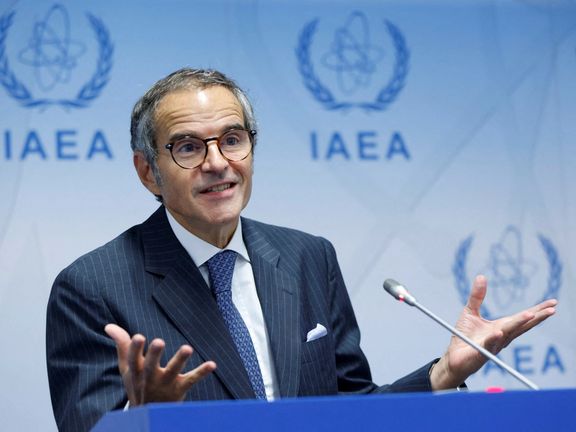
Iran has withdrawn the designation of several inspectors assigned to conduct verification activities in Iran under the Non-Proliferation Treaty Safeguards Agreement.
Rafael Grossi, Director General of UN nuclear watchdog, International Atomic Energy Agency (IAEA), made the rare public statement on Saturday amidst the national rallies taking hold in Iran and abroad around the one-year anniversary of the death of Mahsa Amini.
It is the latest move to stonewall inspectors by the Iranian regime, which just recently withdrew the designation of another experienced IAEA inspector for Iran.
“With today’s decision, Iran has effectively removed about one third of the core group of the Agency’s most experienced inspectors designated for Iran,” Grossi said in a statement.
“This measure, while formally permitted by the NPT Safeguards Agreement, has been exercised by Iran in a manner that affects in a direct and severe way the ability of the IAEA to conduct effectively its inspections in Iran.”
Grossi strongly condemned Iran's "disproportionate and unprecedented unilateral" decision, saying it will affect the IAEA's verification activities in Iran.
He admitted that it is both “a step in the wrong direction” and “constitutes an unnecessary blow to an already strained relationship between the IAEA and Iran in the implementation of the NPT Safeguards Agreement”.
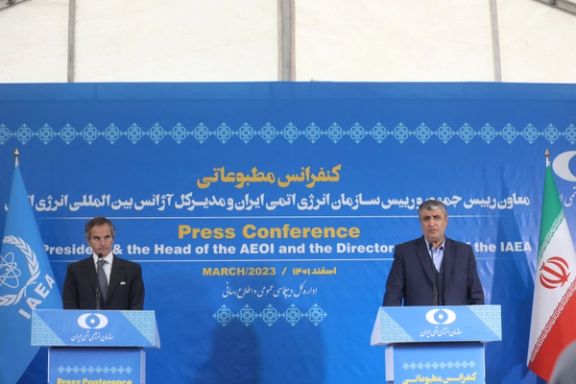
In reaction to the IAEA statement, Iran's Foreign Ministry spokesman said the country's decision to withdraw the designation of several IAEA inspectors is based on its rights under the Article 9 of Iran-IAEA Safeguards Agreement (INFCIRC/214).
Earlier this week, another meeting of the Board of Governors of the IAEA continued with no effective step to address the questions surrounding Iran’s nuclear program.
Iran is known to have expanded its program significantly since 2018, when the United States unilaterally withdrew from the Iran nuclear deal – or Joint Comprehensive Plan of Action (JCPOA).
On Wednesday, three signatories of the deal, UK, France, Germany (E3) delivered a joint statement at the IAEA Board of Governors meeting, in which they condemned Iran’s lack of transparency with regards to its nuclear program.
However, despite their emphasis on Iran’s non-compliance, the E3, much like the US, fell short of introducing measures that would ensure Tehran’s cooperation with the IAEA. On the contrary, just in August the Biden administration agreed to release $6 billion of Iran’s funds blocked in South Korea due to US sanctions, in exchange for five US citizens held hostage in Tehran.
In the State Department’s press briefing Wednesday, Spokesperson Matthew Miller refused to comment on why a resolution condemning Iran’s non-cooperation was not introduced at the IAEA meeting. Pressed by a reporter, Miller said the Biden administration would only work with other members “to clearly express that Iran should cooperate fully with the IAEA.”
This was in line with a joint statement delivered to the IAEA Board of Governors meeting on behalf of the US and 62 other member states, including all EU countries, Turkey, Kuwait and Saudi Arabia.
In January, IAEA inspectors at Fordow detected undeclared centrifuge configuration changes as well as particles of uranium enriched up to 83.7%. In March, Grossi visited Iran and brought back an agreement that was hailed as a breakthrough by both sides but deemed insufficient and non-binding by its critics.
The agreement (or the Joint Statement) stood on the premise that Iran had “expressed its readiness” to “provide further information and access” and “allow the IAEA to implement further appropriate verification and monitoring activities” on a “voluntary” basis.
Six months on, the premise seems to have been shaky at best. According to the IAEA, Iran has accumulated enriched uranium (5-60%) far beyond JCPOA limits
Iran continues enrichment in Fordow, where inspectors detected undeclared particles of uranium enriched at 83.7%.
In Saturday’s statement, Grossi urged the regime to come back to the table. “Without effective cooperation, confidence and trust will continue to be elusive and the agency will not be in a position to discharge effectively its verification mandate in Iran and provide credible assurances that nuclear material and activities in Iran are for peaceful purposes,” he said.
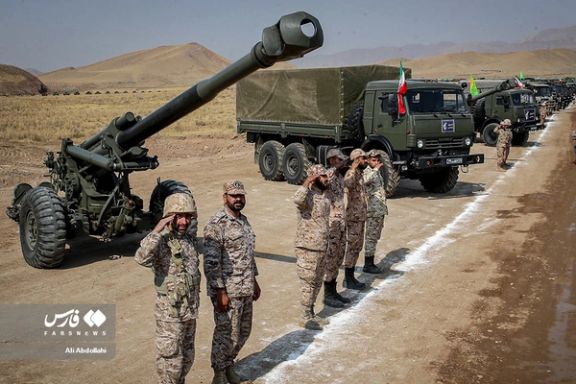
Israeli intelligence claims Iran's elite combat force, the Imam Hossein Division operating within Syria, has been surreptitiously storing advanced weaponry in residential neighborhoods and soccer fields.
According to reports from WallaNews, the force -- linked to the Quds Force of Iran’s Revolutionary Guards (IRGC), comprised of 1,000 seasoned weaponry experts equipped with an extensive arsenal of drones and missiles, has been actively engaged in Syria, where it has also integrated 5,000 foreign fighters into its ranks.
The foreign mercenary fighters, hailing mainly from Nigeria, Mali, Niger, Lebanon, and Afghanistan, were recruited, and trained for their roles, primarily geared towards religious warfare, added the report.
In exchange for their service, they receive monthly salaries in the hundreds of dollars, along with access to cutting-edge weaponry.
The division's operational structure comprises 5,000 mobile fighters who are mainly active in regions between Aleppo, Homs, and along the Turkish border. They are tasked with combating local resistance pockets opposing the Assad regime within various cities.
Over the past year, the Imam Hossein Division has been consolidating its infrastructure and establishing headquarters in and around Damascus. Additionally, the division has conducted several operations against Israel.
The IDF's intelligence branch is closely monitoring the activities of the heavily armed Iranian militia, particularly for any plans that may pose a direct threat to Israel, read the report.
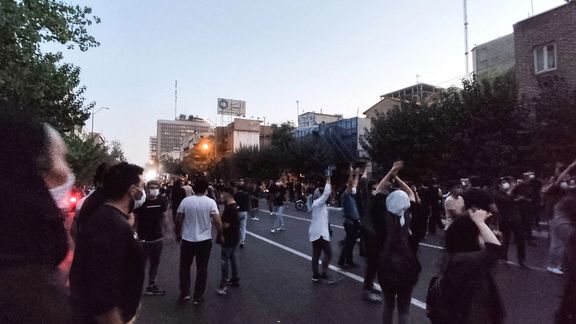
An alliance of underground youth groups, formed during last year’s protests in Iran says it has not only endured but also expanded its efforts aimed at toppling the regime.
Speaking to Iran International, a representative of the United Youth of Iran (UYI) revealed that despite the government's repressive tactics, including widespread arrests and significant communication challenges, they have successfully broadened their efforts. Extending their outreach, they have gone beyond the alliance's initial scope, to connect with a diverse range of groups that were active during the protests. This includes workers' associations, activists, women's and student groups, as well as civil society organizations.
“This was one of our most important achievements,” the representative who requested anonymity said about UYI.
The alliance of youth groups says it fights alongside other Iranians to free the country from its repressive regime.
UYI was formed when several so-called ‘neighborhood youth groups’ found each other on social media and published a manifesto in early December, less than three months after the death of Mahsa Amini in the custody of morality police sparked several-month-long protests across Iran.
The manifesto circulated on social media said it was meant to “pave the grounds for dialogue and cooperation” among various trade organizations, unions, political groups and activists inside Iran and abroad. It has been revised several times since then.
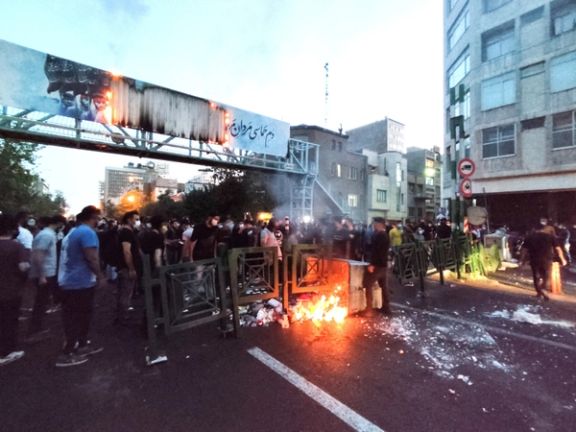
The document said getting rid of the Islamic Republic, separation of religion and state, and the “formation of an inclusive, democratic government” formed the cornerstone of the manifesto.
“Obviously, the regime makes every effort to identify and arrest members of youth groups and clamps down on these groups to prevent them from growing. They also use tactics such as spreading rumors about our connection with dubious political groups,” the representative of UYI told Iran International.
According to her, youth groups from twenty-three cities out of the thirty-five that initially joined the alliance have persevered and remain actively engaged on the ground, consistently prepared for protests. Meanwhile, some have been forced to operate covertly due to security concerns, while others have been compromised following the arrest of their members.
“We contact each other through safe online applications such as Session and Signal but many underground activists are very weary of any contact. Some of them also have difficulty accessing the internet,” one of the leaders of the alliance who also requested anonymity told Iran International.
“The Revolutionary Guard has gained access to social media accounts of some of the original neighborhood youth groups and is controlling their accounts,” he said.
“Last year, even before Mahsa was killed, you could easily feel people’s anger on the streets, the anger coming from loss of hope in the improvement of their lives, … There was an air of darkness and misery,” Behzad, a twenty-one-year-old student of philosophy from Karaj and a member of UYI told Iran International.
According to Behzad and several other members of youth groups, Mahsa’s death sparked the protests, but it was not only vengeance that drove them to the streets to protest. People were fed up with the regime and wanted it gone, they said.
“The Islamic Republic has been dead for a long time. It has lost its legitimacy amongst the people. I’m certain that its annihilation is going to be expedited by the constant attrition among its loyal forces … People will return to the streets again, when the time comes, because we really don’t have anything to lose,” Behzad said.
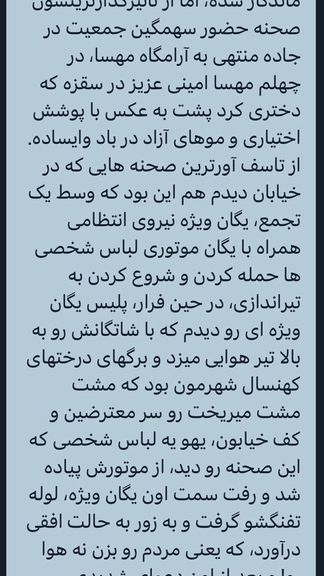
“Mahsa’s killing, another example of the clerical regime’s suppression, increased people’s anger to the extent that it became explosive,” Haleh, 29, who studies arts in Esfahan (Isfahan) said.
"I joined protesters on the streets for the first time in January 2017 when the recent protest movement emerged. It was at that moment that protests in Iran transformed into a revolutionary movement due to the economic and political despair among the people," she added.
Sina, a 25-year-old studying for a master's degree in accounting in Tehran, expressed that the only conceivable future for himself and individuals in a similar situation is emigration or a transformation in the country's governance, as the current circumstances are unsustainable.
“There was this shared pain, the pain that most of the population felt … The drop in the election turnout [in 2020 and 2021] was indicative of the loss of hope in any improvement through the ballot box,” Sina said.
Arezou (27) from Nowshahr in northern Iran who holds a degree in literature also said the future looked dark and miserable to her before last year’s protests. “My country would still be sitting on the verge of an abyss even if I found a way to a bright future for myself … From economy to the environment, from politics to the society’s ethics, everything was quickly falling into decay.”
Last year’s protests spread to many large and small cities across the country, and even to some very conservative towns and villages, despite heavy-handed government crackdowns and recurring internet blackouts but gradually subsided by early 2023, when the regime took even a harsher approach and hanged two young protesters, Mohsen Shekari and Majidreza Rahnavard, in public and five others in the following months.
Around 500 were killed by security forces, tens of thousands of protesters were arrested, thousands were wounded, and hundreds lost their eyes to pellets fired directly at them by security forces during the Mahsa protests.
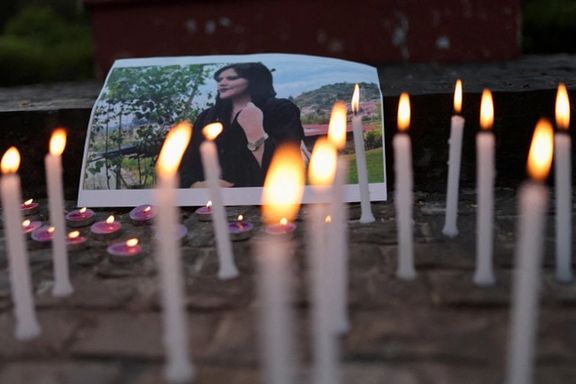
Security is tense in Iran in anticipation of protests on the anniversary of Mahsa Amini's death, with her parents under house arrest and the regime diverting water from a nearby dam to block access to her hometown's cemetery.
Amjad Amini, Mahsa's father, was briefly detained on Saturday and subsequently placed under house arrest with his wife. This occurred amid a heavy security presence around their home in the Kurdish-majority city of Saqqez in western Iran.
According to online footage, city authorities have opened the gates of the Cheraghveis dam, located about 17 kilometers southwest of Saqqez. This diversion allows water from the dam's reservoir to flow through a river, effectively blocking access roads to the Ayyachi Cemetery, where Mahsa is buried. Mahsa, a 22-year-old Iranian-Kurdish woman, died in hijab police custody last year, sparking Iran's largest anti-regime protests. Security forces had already sealed off the main entrance to the cemetery on Friday.
On the eve of Mahsa's first death anniversary, people chanted slogans from their windows in Tehran and many other cities across the country. However, planned street protests for the day have been scarce due to the heavy presence of security forces.
Social media has been inundated with images and reports depicting an unprecedented security presence in Kurdish provinces and major cities, including Tehran, Karaj, Rasht, and Tabriz.
Grassroots activists in Tehran informed Iran International on Saturday that the city's main squares are crowded with military and an assortment of security forces, including many plainclothes agents. Military riot control vehicles are stationed every 10 meters in some locations, with black vans positioned to contain potential detainees in between. Some neighborhoods in the capital, with limited access to main streets, such as Ekbatan, have been completely cordoned off by vehicles as security forces patrol the area continuously.
Checkpoint inspections have been established at the entrances to all Kurdish-populated cities, resulting in significant traffic congestion and thorough searches of both passengers and vehicles.
Calls for action by foreign-based activists continue, with numerous Iranian expatriates holding gatherings in several European cities, including Brussels and Paris. Rallies were held in Australia, New Zealand, and Japan earlier in the day.
However, state media claim Amini's hometown of Saqqez was "completely quiet" and that calls for strikes and protests in Kurdish areas had failed due to "the presence of security and military forces".
IRNA quoted an official in the Kordestan province as saying, "A number of agents affiliated with counter-revolutionary groups who had planned to create chaos and prepare media fodder were arrested in the early hours of this morning."
In the protests that followed Amini's death more than 500 people, including 71 minors, were killed, hundreds injured and thousands arrested, rights groups said. Iran carried out seven executions linked to the unrest.
Iran International covered events on Mahsa Amini's death anniversary on September 16. Below are videos and developments in Iran and abroad.
----------------------------------------------------------------------------------------------------------------------------------------------------------------
People in the central city of Arak are out on streets in defiance of regime’s security measures.
----------------------------------------------------------------------------------------------------------------------------------------------------------------
With nightfall across Iran, the number of protesters is increasing on streets. In this video from the northern city of Rasht, people are chanting “death to dictator,” referring to the Supreme Leader.
----------------------------------------------------------------------------------------------------------------------------------------------------------------
While the internet is disrupted across the country, videos of Saturday’s protests are being published in the evening. In this video from earlier in the day, security forces are seen attacking people near Enghelab (revolution) square in Tehran.
----------------------------------------------------------------------------------------------------------------------------------------------------------------
Anti-riot police on motorcycles armed with clubs and shotguns swarm the streets of Ekbatan district in Tehran. Person who posted the video says that one would think they have come to war against armed guerillas, but they have come to attack ordinary citizens.
----------------------------------------------------------------------------------------------------------------------------------------------------------------
People singing traditional Kurdish songs at Mahsa Zhina Amini's grave near her hometown Saqqes.
----------------------------------------------------------------------------------------------------------------------------------------------------------------
Video from earlier in the day in Mashhad shows clashes as a man is heard claiming that protesters are beating security forces as heavy congestion prevents backup forces to reach the square.
----------------------------------------------------------------------------------------------------------------------------------------------------------------
Iranian expatriates in several Italian cities, including Rome, Milan and Bologna held rallies on the occasion of the death anniversary of Mahsa Amini.
----------------------------------------------------------------------------------------------------------------------------------------------------------------
----------------------------------------------------------------------------------------------------------------------------------------------------------------
----------------------------------------------------------------------------------------------------------------------------------------------------------------
----------------------------------------------------------------------------------------------------------------------------------------------------------------
People in the city of Karaj, near the capital Tehran, are chanting "We are a great nation; we will reclaim Iran."
----------------------------------------------------------------------------------------------------------------------------------------------------------------
Security forces are using fire department vehicles for crowd control in the city of Langarud in northern Gilan province.
----------------------------------------------------------------------------------------------------------------------------------------------------------------
People in the city of Mashhad, known for its religious significance, are out on streets rallying in support of the Women, Life, Freedom protests while others express support with long honks from their cars.
----------------------------------------------------------------------------------------------------------------------------------------------------------------
Iranians living in Sweden also marched in the streets of Malmo as they chanted the main slogans of the protests in Iran.
----------------------------------------------------------------------------------------------------------------------------------------------------------------
To prevent movement of people between Kurdish-majority cities, security forces have blocked the road from the city of Baneh to Saqqez, the hometown of Mahsa Amini, where security is intense in anticipation of large gatherings.
----------------------------------------------------------------------------------------------------------------------------------------------------------------
----------------------------------------------------------------------------------------------------------------------------------------------------------------
Security forces are quick to attack to disperse people as they gather together to form groups. This video shows regime agents clashing with several people in front of the University of Tehran.
----------------------------------------------------------------------------------------------------------------------------------------------------------------
In addition to a rally, the Iranian diaspora community in Australia held an event about the uprising in Iran where several Australian officials such as lawmaker Keith Wolahan delivered speeches about the prospects of a revolution in Iran.
----------------------------------------------------------------------------------------------------------------------------------------------------------------
Iranian expatriates in several German cities such as Heidelberg and Frankfurt have held rallies in support of the Women, Life, Freedom movement, chanting slogans against the Islamic regime and its ruler Ali Khamenei.
----------------------------------------------------------------------------------------------------------------------------------------------------------------
City authorities in the French capital Paris renamed a park to Jardin Villemin Mahsa Jina Amini during a ceremony attended by Iranian expatriates and Paris mayor, Anne Hidalgo, on the death anniversary of the main icon of Iran’s Women, Life, Freedom movement.
----------------------------------------------------------------------------------------------------------------------------------------------------------------
Iranian diaspora community in the German city of Hanover held a gathering to commemorate the death of Mahsa Amini at the hands of the Islamic Republic’s morality police and express solidarity with the Women, Life, Freedom movement.
----------------------------------------------------------------------------------------------------------------------------------------------------------------
Security agents have already attacked people in Tehran's Revolution Street midday Saturday, beating and arresting passersby.
----------------------------------------------------------------------------------------------------------------------------------------------------------------
Iranians in Denmark holding a rally on Saturday to mark the first anniversary of anti-regime protests.
-----------------------------------------------------------------------------------------------------------------------------------------------------------------
Many journalists, lawyers, activists, students, academics, artists, public figures and members of ethnic minorities accused of links with the protest wave, as well as relatives of protesters killed in the unrest, have been arrested, summoned, threatened or fired from jobs in the past few weeks, according to Iranian and Western human rights groups.
-----------------------------------------------------------------------------------------------------------------------------------------------------------------

Western powers imposed more sanctions on Iran Friday, highlighting the brutality of the Islamic Republic on the one-year anniversary of the death of Mahsa Amini.
The United States, The United Kingdom, Canada and the European Union also issued a series of statements voicing support for the Iranian people and women and condemning the government for violence against its own population.
“Jill and I join people around the world in remembering her—and every brave Iranian citizen who has been killed, wounded or imprisoned by the Iranian regime for peacefully demanding democracy and their basic human dignity,” President Joe Biden said in a statement.
Amini, 22, was arrested because the hijab police felt her hair wasn’t covered properly. She was hit on the head in custody and died in hospital on 16 September 2022.
People took to the streets in anger and disbelief, first at Mahsa’s hometown of Saqqez in the Kurdistan province and then all over Iran. More than 500 were killed and tens of thousands were arrested in the weeks that followed, as armed police and loyal thugs joined forces to save the regime from the most serious popular challenge to its authority since 1979.
Commemorating Mahsa and the months-long anti-regime protests in Iran, the governments of US, UK and EU announced new rounds of sanctions that would target “some of Iran’s most egregious human rights abusers”, in the words of President Biden.
Those sanctioned by the US include high-ranking members of the IRGC, the head of Iran’s Prisons Organization, and officials linked to Iran’s internet blockade. The English state channel (PressTV) and two IRGC-affiliated media (Fars and Tasnim) were on the list too.
The US Treasury said in a statement that it will take more “collective action against those who suppress Iranians’ exercise of their human rights.”
Britain separately sanctioned senior officials with connection to enforcing mandatory hijab, including the minister for Culture and Islamic Guidance, who has taken action against actresses and businesses for defying the mandatory hijab. Also on the UK list are the Mayor of Tehran, and the Police Spokesman, who has threatened to impound vehicles whose driver or passengers choose to not cover their hair.
The UK Foreign Secretary, James Cleverly, commended the bravery of Iranian women and reaffirmed the UK's unwavering commitment to supporting the Iranian people's pursuit of fundamental rights.
However, the UK has refused to designate Iran's notorious Revolutionary Guard as a terrorist organization and together with the United States have not pursued the prolongation of UN restrictions on Iranian missile exports that will expire in October.
Some commentators were quick to point out, however, that the UK government's actions speak louder than their words.
Kasra Aarabi, Director of UANI (United Against a Nuclear Iran) reminded Cleverly that the UK government had refused to add IRGC to its list of terrorist organizations. He wrote on X (formerly twitter): “UK Foreign Office's explicit opposition to IRGC proscription not only puts UK lives at risk, it’s given IRGC a propaganda victory before the anniversary of Mahsa Amini’s murder.”
Similar criticisms were leveled at Biden, whose nice words for ‘courageous people of Iran’ have coincided with a secretly negotiated prisoner swap which would see $6 billion handed to the repressive regime.
Jonathan Schanzer of Foundation for Defense of Democracies wrote on X:
“US Imposes Sanctions on the Anniversary of Mahsa “Zhina” Amini’s Death — after authorizing $6 billion in ransom payments that will only serve to boost the coffers of this rotten regime. The strategic incoherence is staggering.”
The prisoner swap seems to be imminent. If it happens on or around 16 September, it would no doubt gobble up precious airtime and overshadow the ‘anniversary’.
Iran has faced growing international isolation and sanctions due to its human rights violations and the supply of UAV technology to Russia for use in Ukraine. Notably, Iran was removed from the UN Commission on the Status of Women in December 2022.






